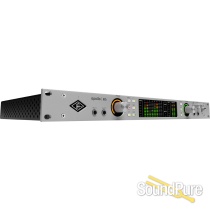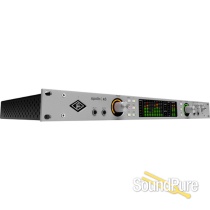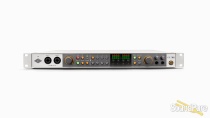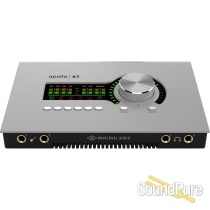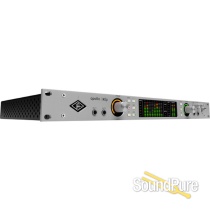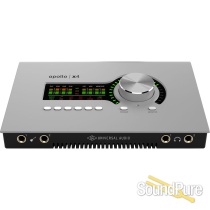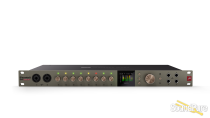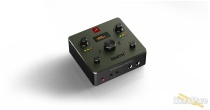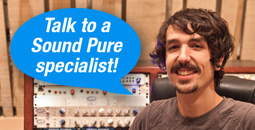-
Call Us Toll Free888-528-9703
-
Local/International (+1)919-682-5552
- Call Us! Toll Free! 888-528-9703
- Local / International (+1) 919-682-5552

Universal Audio Apollo x8 TB3 Interface From UA
Elite Audio Conversion with Four Unison Mic Preamps, HEXA Core Processing, and Surround Sound.
Manufacturer's Description from UA
Apollo x8 allows music producers, project, and post-production studios to track, overdub, and mix with elite-class A/D and D/A conversion, HEXA Core UAD plug-in processing, Dual-Crystal clocking, and 7.1 surround sound monitoring — all in a sleek rackmount Thunderbolt 3 audio interface for Mac or Windows.
Built upon UA’s 60-year heritage of audio craftsmanship, this 18 x 24 interface distinguishes itself with four Unison™-enabled mic preamps, all-new HEXA Core processing — yielding 50% more DSP for running UAD Powered Plug-Ins in real time — plus it includes LUNA Recording System, giving you a fully-integrated music production application.
- Record with elite-class A/D and D/A conversion — nearing the widest dynamic range and lowest noise available, at any price
- Mix with powerful HEXA Core processing, featuring 6 UAD DSP chips for running more UAD Powered Plug-Ins in real time
- Track with near-zero latency through Unison™ preamp emulations from Neve,® API, ® Manley, ® Helios, ® Fender,® and more†
- Includes LUNA Recording System — a fully-integrated and inspiring music production application
Elite-Class A/D and D/A Conversion
With thousands of chart-topping songs and hundreds of Grammy-winning albums under their belt, Apollo interfaces are no strangers to tracking stellar-sounding records. To improve on the previous generation Apollo interface’s class-leading audio conversion, UA engineers obsessively auditioned the latest A/D and D/A converters — ultimately pairing elite-class 24-bit/192 kHz converters with all-new analog circuitry for an ultra-pristine signal path.
The Apollo X series also introduces new Dual-Crystal clocking — featuring dedicated crystals for 44.1/88.2/176.4k and 48/96/192k sample rates — resulting in stunningly low jitter, measured at less than 10 picoseconds. This translates into pure, artifact-free recordings and solid stereo imaging you can trust.
With 129 dB dynamic range and -119 dB THD+N, Apollo x8’s open, natural sound quality rivals any dedicated high-end converter on the market — regardless of price — and is the perfect starting point for applying UAD processing.
Realtime UAD HEXA Core Processing
Apollo x8 features new HEXA Core processing, with six DSP chips and 50% more UAD plug-in processing power than previous Apollos. This lets you run more UAD plug-ins, whether you’re tracking in real time with channel strips from Neve, Manley, or API, or running high UAD plug-in counts when mixing in your DAW.
From the tube warmth of Pultec EQs on guitars to the musical tube limiting of the LA-2A on vocals, or the pump of a genuine 1176 or Fairchild 670 tube compressor on drums, your recordings will take a giant leap forward with a rich, three-dimensional analog sound that UAD plug‑ins provide.
Unison Technology: The Genuine Sound of Neve, API & Manley Preamps
Perfect for musicians, engineers, producers, and sound designers, Apollo x8 features four Unison-enabled mic preamps, letting you track through exacting mic preamp emulations from Neve, API, Manley, Helios, SSL, and Universal Audio. A Universal Audio exclusive, Unison technology nails the tone of these sought-after tube and solid state mic pres — including their input impedance, gain stage “sweet spots,” and the component-level circuit behaviors of the original hardware.
The secret to Unison is its hardware-software integration between Apollo’s mic preamps and its onboard HEXA Core DSP Acceleration. Simply place a Unison preamp plug-in on your mic input in Apollo Console software, and it physically reconfigures the Apollo interface's impedance — so you can tap into the classic sounds of the world’s most recorded mic preamps.
A Full Suite of Classic Analog Processing Onboard
Of course, a hallmark feature of Apollo is its Realtime UAD Processing, letting you run the full library of UAD plug-ins with near-zero latency. Apollo x8 includes the Realtime Analog Classics Plus plug-in bundle, so you can record and mix with the world’s only authentic Teletronix LA-2A, 1176LN, and Fairchild compressors, the Unison-enabled UA 610-B Tube Preamp & EQ, and iconic guitar and bass amps from Marshall and Ampeg.
- UA 610-B Tube Preamp and EQ
- Marshall Plexi Classic Amplifier
- Fairchild 670 (Legacy)
- Teletronix LA-2A Classic Leveling Amplifier (Legacy)
- 1176SE Classic Limiting Amplifiers (Legacy)
- 1176 LN Classic Limiting Amplifiers (Legacy)
- Pultec Pro Equalizers (Legacy)
- Ampeg SVT-VR Classic Bass Amp
- Precision Mix Rack Collection
- UA Precision Enhancer Hz
- Raw Distortion
- RealVerb Pro
Going beyond the included Realtime Analog Classics Plus plug-ins, Apollo x8 lets you tap into the full UAD Powered Plug-In library of legendary vintage EQs, compressors, reverbs, tape machines, channel strips, and more — at near-zero latency, regardless of your audio software’s buffer size and without taxing your computer’s CPU.
With exclusive emulations from SSL, Neve, Studer, Manley, Helios, API, Ampex, Lexicon, Fender, and more,† it’s like having a studio full of iconic analog gear, in a single rack space. And unlike competing interfaces, these award-winning DSP-powered plug-ins are also available in your DAW for mixing.
†Apollo x8 includes the “Realtime Analog Classics Plus” UAD plug-in bundle. Other UAD plug-ins sold separately at www.uaudio.com.
Surround Sound, Talkback, and More
The Apollo x8 features built-in front-panel monitoring functions including a Talkback mic, Alt Speakers, and assignable Dim or Mono control. Plus, with its comprehensive 7.1 surround monitoring support, Apollo x8 is a boon for engineers and producers working on audio and music for video games, television, and the web. In addition, Apollo x8 offers selectable +24 dBu operation for out-of-the-box compatibility with professional mixing consoles and other high-end pro audio equipment.
Create with a Fast, Natural Workflow in LUNA
Explore analog sound and workflows with LUNA, UA’s Mac‑based recording application for producers and musicians, composers, sound designers, and more.
Designed for seamless integration with Apollo audio interfaces, LUNA gives your recordings big studio sound with built‑in extensions from Neve,® Studer,® and API® — plus inspiring instruments like Moog® Minimoog and Ravel grand piano.
Build an Expanded Studio System Over Thunderbolt
Apollo x8 offers 18 x 24 simultaneous inputs/outputs (8 x 8 analog I/O) and two built-in Thunderbolt 3 ports. This allows users of any Thunderbolt-equipped Apollo Twin or Apollo rackmount audio interfaces to easily combine up to four Apollos and six total UAD-2 devices — adding fast, high-bandwidth I/O and DSP as your studio grows.
Available as Apollo Heritage Edition
Featuring 10 premium UAD titles — including complete plug‑in Collections of our award-winning Teletronix,® UA 1176, and Fairchild® compressors, Helios® Type 69 and UA 610 mic preamps, Pultec® EQs, and more.

About Manufacturer
Universal Audio Inc. was re-founded in 1999 by Bill's sons, James Putnam and Bill Putnam Jr., with two main goals: to faithfully reproduce classic analog recording equipment in the tradition of their father, and to design new digital recording tools with the sound and spirit of vintage analog technology. However, as Bill Jr. recounts, the genesis of "UA, part 2" is actually a bit more serendipitous.
Having grown up in the music industry, Bill Jr. and James ("Jim") Putnam naturally assumed that the music business is where they'd eventually end up. Jim, a touring musician and recording engineer, and their older brother Scott, a studio designer in Southern California, were the first to follow in Bill Sr.'s path. However, Bill Jr. took a more circuitous direction, working for a number of engineering companies before undertaking a doctorate in Electrical Engineering at Stanford University. It was at Stanford that Bill Jr. became closely involved in the Center for Computer Research in Music and Acoustics (CCRMA), specializing in signal processing. It was also at Stanford that Bill Jr. began to assemble a team of the best and brightest minds in the field — who continue to steer many of Universal Audio's engineering efforts to this day.
However, the precise event that led Bill and Jim to start (or "reinvent") Universal Audio in 1999 was unexpected. As Bill Jr. tells it, when Bill Sr. passed away in 1989, he and Jim were faced with the Herculean task of cleaning out their dad's workshop and storage areas. While going through Bill Sr.'s old test equipment, boxes of parts, bits and pieces of consoles, and half-cannibalized 1176 compressors, Jim came across their father’s old design notebook. The two spent the evening poring over his notes, realizing that this was the map to every technical problem their father had ever solved. It was at that moment that they decided to bring back Universal Audio and its classic products.
Fast forward a decade. Now with nearly 80 employees and legions of new customers worldwide, UA is headquartered near the Silicon Valley, in Scotts Valley, California — where our classic analog gear is still hand-built, one unit at a time. The lengths we go to deliver the exact sound and performance of classic analog audio gear is unparalleled; in fact, the goal is for UA's modern units to perform identically to well-maintained units built decades ago.
Of course, analog is only half the story. At Universal Audio, we employ the world's brightest DSP engineers and digital modeling authorities to develop our award-winning UAD Powered Plug-Ins platform, featuring the most authentic analog emulation plug-ins in the industry. Our DSP gurus work with the original hardware manufacturers — using their exact schematics, golden units, and experienced ears — to give UAD plug-ins warmth and harmonics in all the right places, just like analog.
Specifications
- 18 x 24 Thunderbolt 3 audio interface with class-leading 24-bit/192 KHz conversion (backwards compatible with Thunderbolt 1 & 2 on Mac)
- Realtime UAD HEXA Core Processing for tracking through UAD plug-ins at near-zero latency, regardless of audio buffer size
- Record through 4 Unison-enabled mic/line preamps — giving you fully authentic preamp emulations from Neve, API, Manley, SSL, and more†
- Includes access to LUNA Recording System for a fully-integrated, analog inspired Apollo workflow
- Surround monitor controller up to 7.1 format
- Includes the "Realtime Analog Classics Plus" UAD plug-in bundle. Other UAD plug-ins sold separately.
- UAD HEXA Core processing onboard for additional mixing horsepower for Pro Tools, Logic, Cubase, Ableton, and other major DAWs
- Combine up to 4 Thunderbolt-equipped Apollos and 6 total UAD devices
- Selectable +24 dBu operation for easy compatibility with professional mixing consoles and tape machines
- Convenient front panel monitoring functions including Alt Speakers, Talkback mic, and assignable Dim or Mono
- Free, industry-leading technical support — on the phone and online — from knowledgeable audio engineers
Inputs
Line Inputs
8 Balanced ¼" TRS
Microphone Inputs
4 Balanced XLR
Instrument (Hi-Z) Inputs
2 Unbalanced ¼" TS
Digital Inputs (Optical TOSLINK)
ADAT: 8 channels @ 44.1 – 96 kHz
ADAT: 4 channels @ 176.4 – 192 kHz
Digital Inputs (RCA) S/PDIF:
2 channels @ 44.1 – 192 kHz
A to D Conversion
Mic Preamps Dynamic Range:
122 dB (A-weighted)
THD+N: -115 dB (0.00019%)
Frequency Response: 20 Hz – 20 kHz, ±0.05 dB
Line Inputs
Dynamic Range: 123 dB (A-weighted)
THD+N: -113 dB (0.00022%)
Frequency Response: 20 Hz – 20 kHz, ±0.04 dB
Outputs
Line Outputs
8 Balanced ¼" TRS
Monitor Outputs2 Balanced ¼" TRS
Headphone Outputs
2 Stereo ¼" TRS
Digital Outputs (Optical TOSLINK)
ADAT: 8 channels @ 44.1 – 96 kHz
ADAT: 4 channels @ 176.4 – 192 kHz
Digital Outputs (RCA)
S/PDIF: 2 channels @ 44.1 to 192 kHz
D to A Conversion
Line Outputs
Dynamic Range: 127 dB (A-weighted)
THD+N: -118 dB (0.00011%)
Frequency Response: 20 Hz – 20 kHz, ±0.07 dB
Monitor OutputsDynamic Range:
129 dB (A-weighted)
THD+N: -118 dB (0.00012%)
Frequency Response: 20 Hz – 20 kHz, ±0.06 dB
Headphone Outputs
Dynamic Range: 125 dB (A-weighted)
THD+N: -102 dB (0.00080%)
Frequency Response: 20 Hz – 20 kHz, ±0.05 dB




